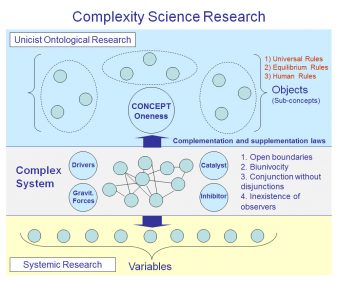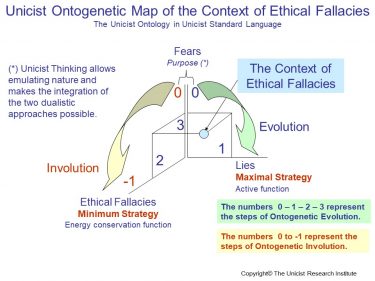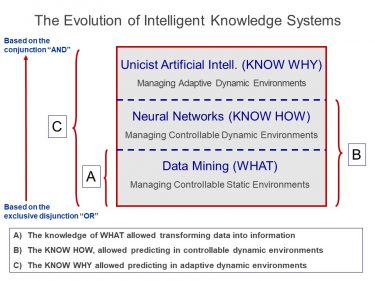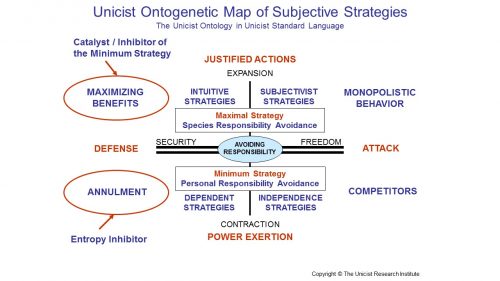We invite young professionals and academics to contact us to participate in the research projects of The Unicist Research Institute: n.i.brown@unicist.org More than 200 researches were finished in 2016 and five major scientific breakthroughs were finished in 2017. They introduce a structural change in scientific research:
 The unicist ontology of the integration of the restricted and wide contexts that explains the failures in political decisions and allows ensuring strategies. It is being published after 10 years of use and testing. (Complexity Sciences)
The unicist ontology of the integration of the restricted and wide contexts that explains the failures in political decisions and allows ensuring strategies. It is being published after 10 years of use and testing. (Complexity Sciences)- The structure of unicist tactics that ensures the functionality of strategies. It is being published after 20 years of applications. (Future Research and Strategy)
- The unicist semiotic research methodology that allows researching virtual communication and ensuring its functionality. It is being published after 7 years of application and testing implicit weaknesses and their effects. (Semiology)
- The context of social dysfunctional utopias that allows forecasting the evolution of cultures. It is being published after 10 years of application in future scenario building. (Anthropology)
- The context of personal dysfunctional utopias that allow influencing personal evolution. It is being published after 15 years of application in the educational field. (Psychology)
More than 5,000 unicist ontological researches were developed since 1976 in the field of individual, institutional and social evolution. The main countries that originated these researches were: US, DE, UK, FR, JP, SE, CA, CH, IN, BR, AR, CAT, RU, CN, AU. TURI’s Future Research Laboratory completed the research of 70 countries’ archetypes.
Scientific applications of the Unicist Theory that expanded the boundaries of existing sciences by solving their complex aspects:
In Scientific Research – 1980: Development of a unicist ontological methodology for complex systems research, substituting the systemic approach to research adaptive systems. 2014: The integration of the unified field of macro and micro behavior. 2015: Development of the destructive and non-destructive tests to research adaptive environments.
In Life Sciences – 1988: Discovery of the functional structure that regulates evolution and the unicist ontological structure of living beings as a unified field. 2006: Discovery of the unicist ontological algorithm of evolution and involution. 2008: Discovery of the two types of integration, complementation and supplementation, of elements in complex adaptive systems. 2012: Discovery of the unicist ontology of biological entities. 2013: Confirmation of the unicist ontology of viruses. 2014: Discovery of the ontological structure of chronic diseases. 2014: Discovery of the structure of therapeutics. 2015: Discovery of the ontological structure of health. 2016: Development of the Scientific Foundations of Medicine.
In Complexity Sciences – 1998: Development of the unicist ontology emulating the ontogenetic intelligence of nature. 2003: Discovery of the anti-concepts that work as antimatter. 2006: Development of objects to manage human adaptive systems emulating the structure of nature. 2011: Discovery of the unicist ontology of complex adaptive systems. 2014: Discovery of the behavior of objects in complex adaptive systems. 2015: Discovery of the essential opposition but operational complementation between the active function and the energy conservation function of concepts. 2017: Discovery of the unicist ontology that integrates the wide and restricted contexts.
In Information Sciences – 2002: Development of unicist ontogenetic based ontologies replacing the empirically structured ontologies. 2014: Development of unicist adaptive robotics. 2015: Development of prototypers. 2016: Discovery of the nature of conceptual design.
In Future Research and Strategy – 1984: Modeling of the ontological structures that allow inferring the evolution developing the ontogenetic maps of human adaptive systems. 2014: Confirmation of the functionality of ethical intelligence in future research. 2015: Discovery of the unicist ontology of personal strategies. 2016: Discovery of the nature of entrepreneurial strategies. 2017: Discovery of the double dialectical tactics.
In Logic – 1986: Development and formalization of the integrative and the unicist logic. 2013: Functionality of Dualistic Logic in complex environments. 2013: Discovery of the structure of aprioristic fallacies.
In Anthropology – 1986: Discovery of the “invariables” of human behavior. 1997: Discovery of the double dialectical behavior. 2008: Discovery of the anthropological lifestyles. 2010: Discovery of the institutional and social viruses. 2012: Discovery of the integration of ontogeny and phylogeny. 2012: Discovery of the stagnant survivors’ role in societies. 2012: Discovery of the unicist ontological structure of aptitudes, attitudes and intentions. 2013: Development of the unicist ontology of cultural adaptiveness & over-adaptiveness. 2014: Synthesis of Conceptual Anthropology.2014: Discovery of the Cultural, Institutional, Individual and Social Archetypes. 2015: Discovery of the functionality of rationalism and subjectivism as social and individual addictions. 2016: Discovery of the nature of innovation processes. 2017: Discovery of the context of social dysfunctional utopias.
In Economic Science – 1989: Discovery of the unicist ontological structure of Economics. 1998: Discovery of the unicist ontological algorithm of the price elasticity of demand. 2004: Discovery of the ontogenetic structure of economic models and their functionality. 2011: Discovery of the ontology of currency and inflation. 2012: Discovery of the ontology of the industrialization level. 2012: Discovery of the unicist ontology of the overcoming of scarcity. 2012: Pricing of Futures and Options. 2012: Discovery of the unicist ontology of speculative manipulation. 2014: Synthesis of Conceptual Economy. 2015: Discovery of the unicist ontology of economic freedom.
In Political Science – 1990: Development of the ontological algorithm and the ontogenesis and phylogeny of ideologies and their functionality. 2013: Development of the unicist ontology of Social, Economic and Political Democracy.
In Social Sciences – 1993: Discovery of the collective unconscious and the unicist archetypes of cultures. 2012: Discovery of the role of stagnant survivor elites in the stagnation of segments or cultures. 2016: Discovery of the nature of social networks.
In Linguistics – 2004: Discovery of the unicist ontological algorithms of natural, ambiguous and figurative languages and the unicist ontology of words. 2014: Development of semantic objects. 2015: Discovery of the ontological structure of subliminal communication.
In Mathematics – 1996: Development of the conceptual basis of interdependent, dependent and independent variables. 2014: Development of the mathematical foundations of reality indicators.
In Philosophy – 1994: Development of the unicist ontology integrating philosophy, science and action in a unified field. 1997: Refutation of Hegel’s and Marx’s dialectics and the formulation of the laws of the double dialectics.
In History – 2000: Development of a historical analysis methodology based on the unicist double dialectics.
In Cognitive Science – 2001: Development of a methodology to construct knowledge with existing information through an integrative logic. 2002: Development of the unicist reflection methodology to deal with the nature of reality. 2006: Discovery of the object driven organization of mental processes and the development of cognitive objects. 2008: Development of the ontological algorithms of fundamental analysis. 2013: Development of the unicist ontology of erudition and wisdom (observers vs. participants). 2014: Discovery of the structure of the emulation of reality. 2015: Discovery of the unicist ontology of conceptualization.
In Education – 1979: Discovery of the ontogenetic algorithms of learning which has given scientific sustainability, amongst others, to Piaget. 2014: Discovery and development of learning objects. 2015: Development of Reflection Driven Education. 2016: Discovery of the nature of learning by teaching.
In Psychology – 1984: Discovery of human ontointelligence to deal with adaptive systems. 2003: Discovery of the unicist ontological structure of fallacies, the functionality of anti-intelligence and anti-intuition. 2004: Discovery of the double dialectical thinking process. 2005: Discovery of the unicist ontology and evolution laws of human essential complexes. 2011: Discovery of the unicist ontology of conscious behavior. 2012: Discovery of the unicist ontology of complementation of thinking processes. 2012: Discovery of the unicist ontology of psychopathy. 2014: Discovery of the structure of subliminal decision-making. 2014: Synthesis of Conceptual Psychology. 2015: Functionality of concepts as behavioral objects. 2016: Discovery of the nature of human metamorphosis. 2016: Discovery of the functionality of thinking processes. 2017: Discovery of the context of personal dysfunctional utopias.
In Semiology – 2012: Discovery of the unicist ontology of semiosis as a complex adaptive system. 2015: Development of semiotic role objects. 2017: Development of the semiotic research groups.
Unicist Executive Committee














